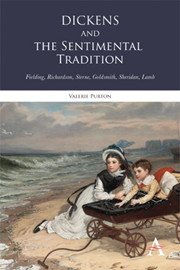Book contents
- Frontmatter
- Contents
- Acknowledgements
- A Note on the Text
- Introduction
- Chapter 1 Dickens and the Sentimentalist Tradition
- Chapter 2 Sentimentalism and its Discontents in the Eighteenth-Century Novel: Fielding, Richardson and Sterne
- Chapter 3 Sentimentalism and its Discontents in Eighteenth-Century Drama: Goldsmith and Sheridan
- Chapter 4 Dickens and Nineteenth-Century Drama
- Chapter 5 The Early Novels and The Vicar of Wakefield
- Chapter 6 The Later Novels
- Conclusion The Afterlife of Sentimentalism
- Notes
- Bibliography
- Index
Chapter 1 - Dickens and the Sentimentalist Tradition
Published online by Cambridge University Press: 05 November 2012
- Frontmatter
- Contents
- Acknowledgements
- A Note on the Text
- Introduction
- Chapter 1 Dickens and the Sentimentalist Tradition
- Chapter 2 Sentimentalism and its Discontents in the Eighteenth-Century Novel: Fielding, Richardson and Sterne
- Chapter 3 Sentimentalism and its Discontents in Eighteenth-Century Drama: Goldsmith and Sheridan
- Chapter 4 Dickens and Nineteenth-Century Drama
- Chapter 5 The Early Novels and The Vicar of Wakefield
- Chapter 6 The Later Novels
- Conclusion The Afterlife of Sentimentalism
- Notes
- Bibliography
- Index
Summary
The literary and cultural history of eighteenth-century sentimentalism is a relatively familiar story. Less often identified is a trait of sentimentalism evident in English literature at least since the medieval mystery plays. When in the Chester Cycle, Isaac, thinking himself about to be killed at God's command by his father Abraham, says ‘Father, tell my mother for nothing’ (that is, ‘Don't let my mother know!’). The combination of pathos and humour is instantly recognisable. Even more so are the blandishments lavished by the shepherds on the Christ child in the Second Shepherds' Play in the Wakefield Cycle: ‘Lo, he laughs, my sweeting!’ ‘Hail, little tiny mop!… little day star’. This suggests the ‘folk’ side of the sentimental mode. In the sixteenth and seventeenth centuries, however, it becomes part of the vocabulary of high culture. The family reunion scene in Shakespeare's The Winter's Tale, reported, not acted out, is an early configuration of Dickens's Dombey family of jealous father, persecuted mother, ill-fated son and cruelly rejected daughter. Father and daughter are reunited after the death of the son and the (apparent) death of the mother and an onlooker tells the audience: ‘their joy waded in tears. There was casting up of eyes, holding up of hands, with countenance of such distraction…[they] did – I would fain say bleed tears; for I'm sure my heart wept blood. Who was most marble there, changed colour; some swooned, all sorrowed’ (V.ii.50, 96–7).
- Type
- Chapter
- Information
- Dickens and the Sentimental TraditionFielding, Richardson, Sterne, Goldsmith, Sheridan, Lamb, pp. 1 - 18Publisher: Anthem PressPrint publication year: 2012

